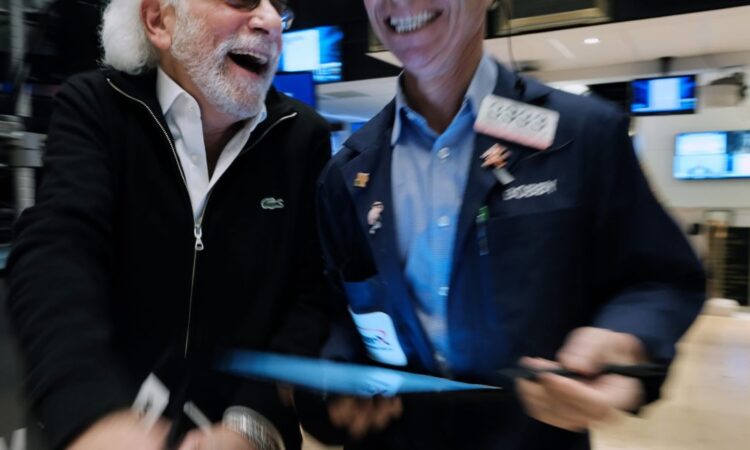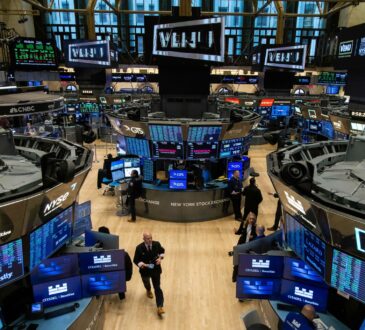
U.S. stocks are climbing closer to their records Friday after the head of the Federal Reserve finally said out loud what Wall Street has been expecting for a while: Cuts to interest rates are coming soon to help the economy.
The S&P 500 was 1% higher after Fed Chair Jerome Powell said the time has come to lower its main interest rate from a two-decade high. The Dow Jones Industrial Average was up 305 points, or 0.7%, as of 10:05 a.m. Eastern time, and the Nasdaq composite was 1.4% higher.
The Fed began to hike interest rates sharply more than two years ago as inflation spiraled to its worst levels in more than 40 years. Its goal was to make it expensive enough for U.S. households and companies to borrow that it slows the economy and stifles inflation.
While careful to say the task is not complete, Powell used the past tense to describe many of the conditions that sent inflation soaring after the pandemic, including a job market that “is no longer overheated.” That means the Fed can pay more attention to the other of its twin jobs: to protect the job market and to keep humming an economy that has so far defied many predictions for a recession.
“The time has come for policy to adjust,” Powell said. “The direction of travel is clear, and the timing and pace of rate cuts will depend on incoming data, the evolving outlook, and the balance of risks.”
But that second part of his statement held back some of the details that Wall Street wanted so much to hear.
Treasury yields had already pulled back sharply in the bond market since April on expectations the Federal Reserve’s next move would be to cut its main interest rate for the first time since 2020. The only questions were by how much the Fed would cut and how quickly it would move.
A danger is that traders have built their expectations too high, something they’ve frequently done in the past. Traders see a high likelihood the Fed will cut its main interest rate by 1 percentage point by the end of the year, according to data from CME Group. That would require the Fed to go beyond the traditional move of a quarter of a percentage point at least once in its three meetings remaining for the year.
If their predictions are wrong, which has also been a frequent occurrence, that could mean Treasury yields have already pulled back too much since they began declining in the spring. That in turn could pressure all kinds of investments. On Thursday, for example, the S&P 500 fell to its worst loss in more than two weeks after Treasury yields climbed.
In the meantime, stronger-than-expected profit reports from a range of companies are helping to support the market.
Ross Stores climbed 3.4% after topping analysts’ estimates for profit and revenue during the latest quarter. But CEO Barbara Rentler also said the retailer’s low- and moderate-income customers continue to feel the pressure of high prices across the economy, even if inflation has slowed.
Workday jumped 11.2% after likewise delivering better profit and revenue than analysts had forecast. The company, which helps businesses manage their people and money, also raised its forecast for a measure of profitability this year.
They helped offset a 9.8% tumble for Red Robin Gourmet Burgers, which reported a worse loss for the latest quarter than expected. It also lowered the top end of its forecasted range for revenue this year amid what it called a slowdown across the restaurant industry.
In the bond market, the yield on the 10-year Treasury fell to 3.80% from 3.86% late Thursday. The two-year yield, which moves more closely with expectations for action by the Fed, dropped to 3.95% from 4.01% late Thursday.
In stock markets abroad, indexes were modestly higher in Europe after closing mixed across Asia.
The Nikkei 225 rose 0.4% in Tokyo after Bank of Japan Gov. Kazuo Ueda appeared to indicate more increases to interest rates may be coming, but they would be gradual.
The Bank of Japan helped set off a scary summertime swoon in financial markets around the world after a rate hike forced many hedge funds and other investors to abandon a popular trade all at once, where they had borrowed Japanese yen at cheap costs to invest elsewhere. An ensuing assurance from a top bank official that it wouldn’t raise rates again as long as markets were shaky helped calm markets.
The S&P 500 is less than 1% below its all-time high set last month after briefly falling nearly 10% below the mark.


